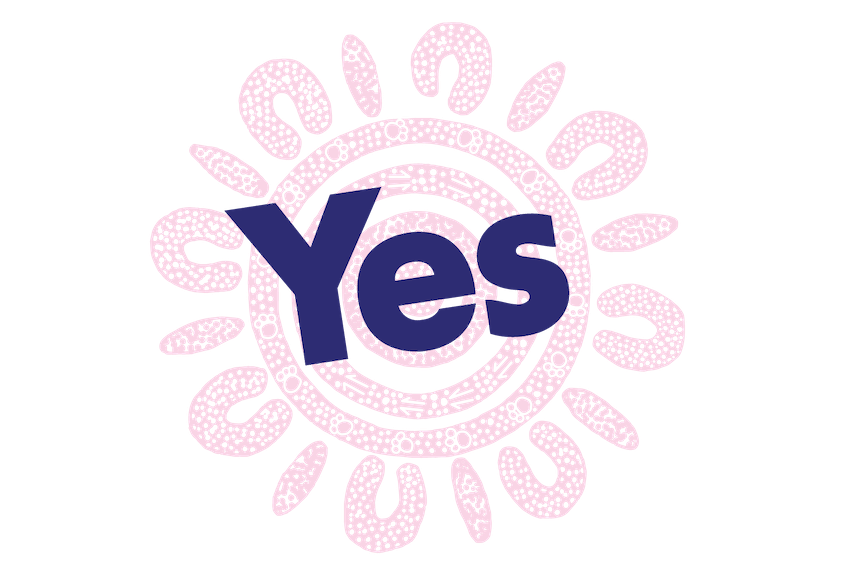YES to the Voice: a letter from Cath Brokenborough, Wirdjuri woman

In honouring our commitment to strive for equity in our workplaces and our communities, it is with pleasure to introduce, Cath Brokenborough, Chair of the Australian Indigenous Leadership Centre and Executive Lead First Nations Engagement and Reconciliation at Lendlease.
We share here her reflections on the constitutional recognition of Aboriginal and Torres Strait Islander people as the First Peoples of Australia and the establishment of a Voice to Parliament.
Later this year, Australians will be asked if there should be constitutional recognition of Aboriginal and Torres Strait Islander people as the First Peoples of Australia and the establishment of a Voice to make representations to Parliament and the Executive Government on matters relating to First Nations Peoples. I believe that saying YES will provide the foundation for more equitable social and economic outcomes for First Nations people, and a fairer, more equal and united Australia.
A referendum will be held to endorse these changes in Australia’s Constitution, so every Australian entitled to vote will have their say, and then afterwards, the Parliament will, in accordance with the Constitution, make laws about the composition, functions, powers and procedures of the First Nations Voice to Parliament.
We are having this referendum because – after 65,000 years of continuous First Nations’ culture and over 235 years since Australia was colonised – it is well overdue that Australia’s First Nations people are recognised in our 122-year-old Constitution. The constitutional recognition of First Nations people has been supported by Prime Ministers of all persuasions since John Howard in 2007.
A Voice to Parliament is what First Nations people want as a form of recognition. It is an important element to achieve the acknowledgement, protection and preservation of our history, cultures and rights. The ‘establishment of a First Nations Voice enshrined in the Constitution’ is specifically called out in the Uluru Statement from the Heart, the most recent request to the Australian people to walk with us to establish a better, shared future.
The Voice will be a vehicle for the real experts in our communities – grassroots First Nations people – to give advice to Parliament and the government about the issues that affect their families and communities and about workable solutions to long-term intractable problems. The issues that a Voice body will advise on are issues like education, health, employment and land management. In the past, First Nations people haven’t had opportunities to have input into policies. Policies, where politicians have made decisions on behalf of First Nations people, have failed repeatedly. Our children and grandchildren will have better services, outcomes and opportunities if they get a seat at the table when policies are being developed. The Voice will not have the power to make laws about these issues, that is, and remains, the job of our elected Members of Parliament.
Reconciliation Australia’s (RA) research consistently shows a majority of Australians support constitutional recognition through a Voice to Parliament. The Australian Reconciliation Barometer, RA’s two-yearly survey on attitudes to reconciliation, in 2022 showed 93% of Australians believe it is important for First Nations people to have a say in matters that affect them. It also showed 87% of Australians believe it is important to protect a First Nations body within the Constitution, so future governments can’t remove it (only another referendum of Australians could do this). A January 26th Sydney Morning Herald poll of First Nations people this year showed that 80% would vote YES.
In the next few months, the Federal Parliament will pass a Bill outlining the proposed changes to the Constitution that we will be voting on and set the date for the referendum. The Australian people will decide the outcome. To be successful, the result must have a majority of voters in each state AND a majority of states voting YES (i.e. a minimum of 4 out of 6 states – NSW, VIC, WA, QLD, SA, TAS – agree to the change). To achieve a resounding YES vote in the referendum, we are going to have to talk to people about why this change to our Constitution is simple, fair and practical.
This is why, all around the country this week, YES to the Voice supporters like me are sparking thousands of conversations. Some people are already on board. Others won’t have thought about it much or be sure where they stand.
We all have a role to play to ensure that Australians have the facts about why this is important. The people you know – whether friends, family, people at work, your church or local sporting club – will be far more influenced by a conversation with you about this than anything they see or hear from a third party. Will you walk with me and spark or join in the conversation?
We are on the cusp of a profound moment in our nation’s journey. A moment that, with the goodwill of all Australians, will finally give First Nations’ people long overdue recognition in our nation’s founding document.
I hope that most Australians will support this recognition and the constitutionally enshrined Voice – this is essential for genuine reconciliation.
We thank Cath for sharing this open letter with International Towers.
Want to learn more?
Check out these two resources:
What is a Voice to Parliament? - From The Heart
The Statement - Uluru Statement from the Heart
As part of our ongoing commitment to Reconciliation, we will be continuing our advocacy for a more just and equitable workplace and society.
If you are a First Nations person seeking a confidential, culturally safe space to yarn about your feelings, needs, worries or concerns, please contact 13YARN - Call 13 92 76 | 24 /7 Crisis support

